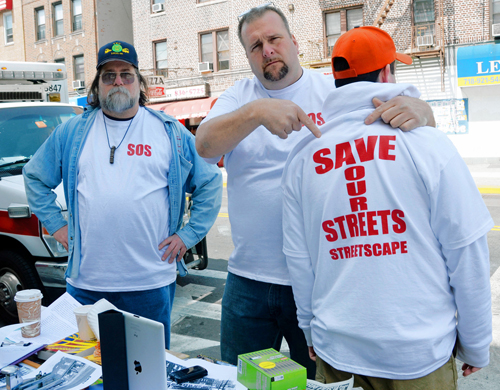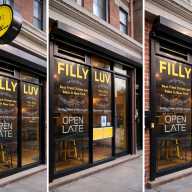Food Carts have evolved into kitchens on wheels that operate on the sidewalks — using grills fueled by gas and propane tanks with illuminated signage. These are stationary businesses with as many as three employees per shift — operating 20 hours per day. They employ a full-time manager and wear uniform polo shirts. This is a well-organized business that takes space on public sidewalks using the amenities, sidewalk cleaning services, and street furniture paid for by assessments levied to protect property and business owners.
We are located in the 86th Street Business Improvement District. In 1995 the Street Vendor Review Panel made the Business Improvement District a Zero Sidewalk Display area. This regulation prohibits stores like mine to use the three feet of sidewalk in front of our property line. Why, then, is a food vendor allowed to stand on the very same sidewalk within these districts?
These food vendor carts are so large that they are driven onto sidewalks, while restaurants with sidewalk cafes have to pay thousands of dollars to the city for the use of the public sidewalk and have strict limitations as it relates to the hours of operation. Food vendor restaurants on wheels do not — they can operate on the sidewalk for 20 hours per day!
Department of Transportation rules state that vendor carts cannot be placed on sidewalks and Department of Health regulations say they can – measurements that are different for food and general vendors.
Can you believe our current law says that a general vendor cannot operate over a subway grate, but a food vendor cart that uses propane and gasoline to operate that holds two to three employees and can weigh 1,000 pounds is allowed to operate over a subway grate? It’s ridiculous!
Rising water bills, increased utility costs, regulatory costs, fines, rents, and the Department of Health’s new grading system are placing a huge financial toll on small businesses, especially on linear shopping strips. A food vendor cart permit is $300 per year — without any fee imposed for the use of the sidewalk or liability to it. We cannot compete with these inequities. The city yields only $82 per permit according to a recent report issued by the Independent Budget Office.
Food Vendor Carts on our block are hurting our businesses — we cannot fairly compete and we need sweeping changes to reform the entire system, which is not working.
The preceeding text consists of excerpts from the Save Our Streets manifesto, outlining brick-and-mortar business owner Tony Gentile’s problems with street vendors on 86th Street and Fifth Avenue in Bay Ridge.
Tony Gentile is the owner of the Lone Star bar on Fifth Avenue and the founder of the Save Our Streets campaign.

























